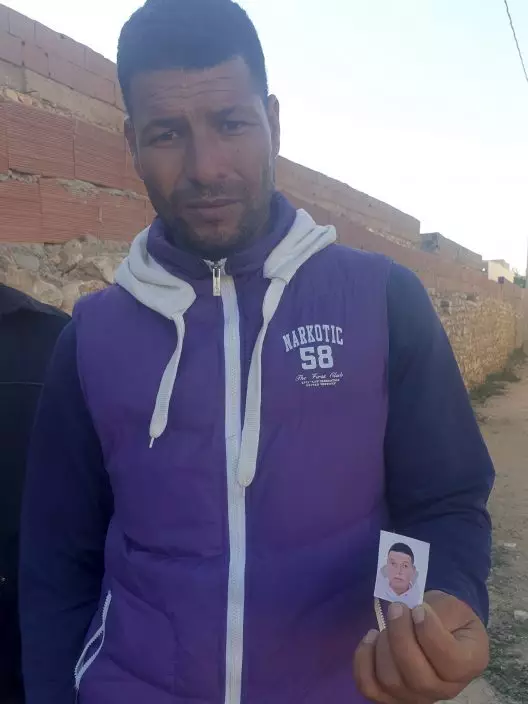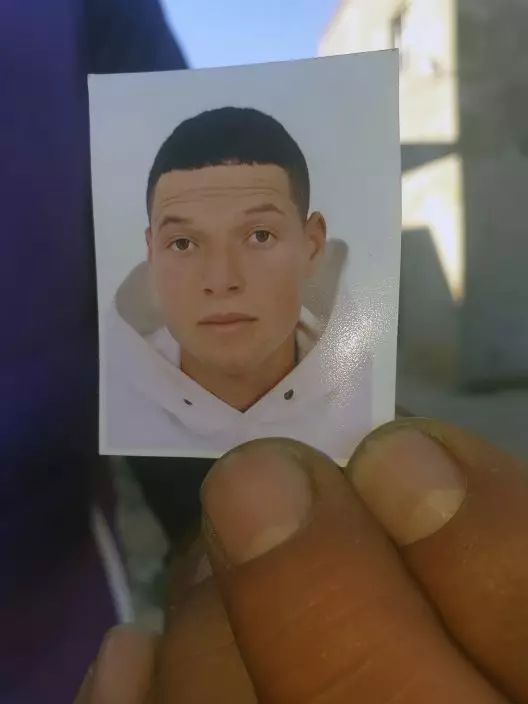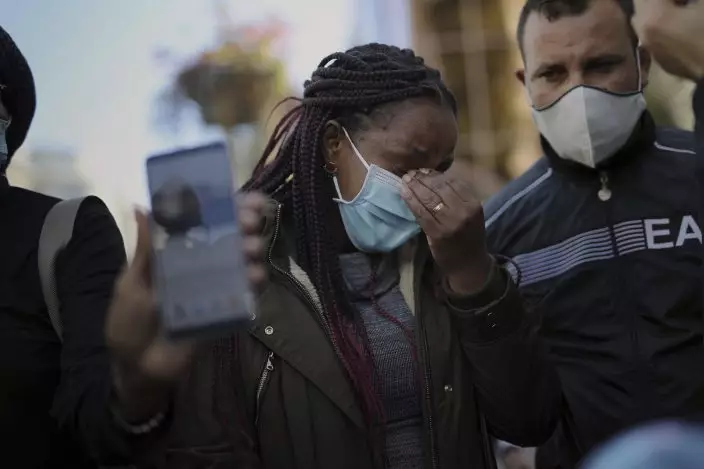A third suspect is in French custody Saturday in connection with an Islamic extremist knife attack that killed three people in a Nice church, as the family of the suspected Tunisian assailant demanded to see video footage of what happened.
Investigators in France, Tunisia and Italy are trying to determine the motive of chief suspect Ibrahim Issaoui and whether he acted alone and whether he premeditated Thursday’s attack on the Notre Dame Basilica.
Authorities have labeled the attack, which took place amid growing tensions around cartoons published by a French newspaper mocking the Prophet Muhammad, an act of Islamist terrorism,

Yassine Issaoui, holds a picture of his brother Ibrahim Issaoui, the Nice attacker, in Sfax, Tunisia, Friday, Oct. 30, 2020. The family of Ibrahim Issaoui expressed shock after he attacked a church in Nice and killed three people in what French and Tunisian authorities are investigating as a terrorist attack. Tunisian prosecutors say he had not been on their radar for radicalization before he fled with other migrants to the Italian island of Lampedusa in September, eventually making his way to Nice. (AP PhotoMehdi El Arem)
Issaoui, who transited through Italy last month en route to France, is in critical condition in a French hospital after being wounded by police as they arrested him.
A 35-year-old man who had met with Issaoui in Nice was arrested overnight, a judicial official said Saturday. A 47-year-old man who had met with Issaoui the night before the attack was already in custody, bringing the number of detained suspects to three. Their connection to the attack remains unclear.
A previously unknown Tunisian extremist group claimed responsibility for the attack, and Tunisian and French authorities are investigating whether the claim is legitimate.

Yassine Issaoui, holds a picture of his brother Ibrahim Issaoui, the Nice attacker, in Sfax, Tunisia, Friday, Oct. 30, 2020. The family of Ibrahim Issaoui expressed shock after he attacked a church in Nice and killed three people in what French and Tunisian authorities are investigating as a terrorist attack. Tunisian prosecutors say he had not been on their radar for radicalization before he fled with other migrants to the Italian island of Lampedusa in September, eventually making his way to Nice. (AP PhotoMehdi El Arem)
In Issaoui’s hometown of Sfax, his family expressed shock and appealed for peace. But they also expressed bewilderment that this young man who drank alcohol and showed no outward signs of radicalism would flee to France and attack a church.
“We want the truth about how my son carried out this terrorist attack. I want to see what the surveillance cameras showed. I will not give up my son’s rights outside the country. I want my son, dead or alive," his mother Gamra told The Associated Press, her words often interrupted by tears.
His father and brother Wissem said that if Issaoui indeed carried out the attack, he should face justice.

Sylva Debrito reacts in front of Notre Dame church after she received a news that a victim was a friend of hers, in Nice, France, Friday, Oct. 30, 2020. A new suspect is in custody in the investigation into a gruesome attack by a Tunisian man who killed three people in a French church. France heightened its security alert amid religious and geopolitical tensions around cartoons mocking the Muslim prophet. (AP PhotoDaniel Cole)
“We are Muslims, we are against terrorism, we are poor. Show me that my brother committed the attack and judge him as a terrorist," Wissem said. "If he was the attacker, he will take his responsibility.”
On the dusty Tina Street in the Nasr neighborhood of Sfax, his friends and neighbors described Issaoui as a man who sold gasoline for motorcycles. While not starving or homeless, he was poor like many in the area, poverty that is driving more and more young Tunisians to seek jobs and opportunity in Europe.
He had had small-time run-ins with the law as a teen, but nothing that alerted Tunisian authorities to possible extremist leanings. That meant that when he was served an expulsion order from Italy, he was basically free to go where he pleased.
Italy’s interior minister, Luciana Lamorgese, told the AP that Italy’s overburdened repatriation centers had no place for him, despite agreements with Tunisia governing the return of citizens who don’t qualify for asylum in Italy.
“Obviously, we give precedence to people who are signaled by law enforcement or by Tunisian authorities,’’ Lamorgese said. “The number of spots are not infinite, and he could not therefore be placed inside a repatriation center.’’


